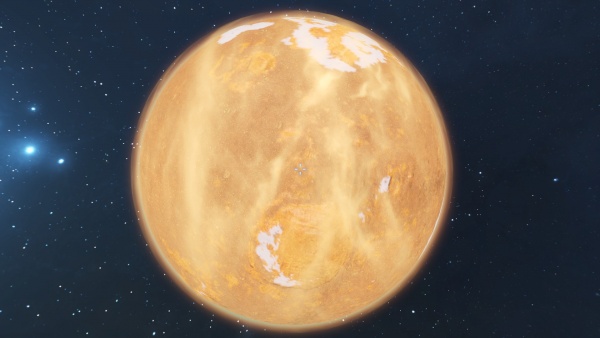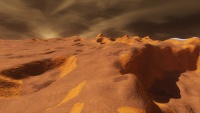Difference between revisions of "Planet/Mars"
From Space Engineers Wiki
(Created page with "{{stub}} == Overview == <Summary of the planet type> === Environment === <Are there trees, grass, etc. What colour is the sky? the ground? Are there lots of canyons or mounta...") |
m (→Overview) |
||
| (7 intermediate revisions by 4 users not shown) | |||
| Line 1: | Line 1: | ||
| + | [[File:Planet_Mars_PMars01.jpg|right|600px|link=]] | ||
{{stub}} | {{stub}} | ||
== Overview == | == Overview == | ||
| − | < | + | Mars is rocky barren world in Space Engineers. Its default size is <code>120km</code>, and also by default its accompanied [[Moon]] is [[Moon/Europa|Europa]]. It has a thin atmosphere that does not contain any [[Oxygen]], and a gravity field of <code>0.9G</code>. As with all other [[Planet]]s in Space Engineers, it is completely destructible and immobile. |
=== Environment === | === Environment === | ||
| − | + | [[File:Planet_Mars_Plntmars01.jpg|left|200px]]The surface of the planet variant Mars is mostly rocky and flat, but does contain extremely large mountains on its surface that reach high up into the atmosphere. The ground has no vegetation to speak of, it only contain sparsely scattered [[Planet#Boulders|Boulders]], and orange, and dark brown patches of [[Ore]] veins. Although less commonly available than on [[Planet/Earth|Earth]], Mars does contain [[Ice]]. They can be located on peaks of tall hills & mountains. The larger ice lakes are scattered far apart from each other, but they're several kilometers in size and are very abundant. | |
| + | The atmosphere of Mars is very thin, and doesn't contain any [[Oxygen]]. Its visual is a very dark-gray unsettling look over the barren landscape. It only extends outwards <code>15km</code> from the surface. | ||
| + | |||
| + | If the weather system is active, Mars is subject to random sand storms at any point. | ||
| + | |||
| + | === Ore generation === | ||
| + | {| class="wikitable" style="text-align:center;" | ||
| + | |colspan="11" style="color:green; background-color:#D8D8D8;height:14px; width:40px;"| | ||
| + | |- | ||
| + | | {{icon|Cobalt Ore|medium}} || {{icon|Gold Ore|medium}} || {{icon|Ice|medium}} || {{icon|Iron Ore|medium}} || {{icon|Magnesium Ore|medium}} || {{icon|Nickel Ore|medium}} || {{icon|Platinum Ore|medium}} || {{icon|Silicon Ore|medium}} || {{icon|Silver Ore|medium}} || {{icon|Stone|medium}} || {{icon|Uranium Ore|medium}} | ||
| + | |- | ||
| + | | style="height:14px; width:40px;" | [[Cobalt Ore]] || style="height:14px; width:40px;" | [[Gold Ore]] || style="height:14px; width:40px;" | [[Ice]] || style="height:14px; width:40px;" | [[Iron Ore]] || style="height:14px; width:40px;" | [[Magnesium Ore]] || style="height:14px; width:40px;" | [[Nickel Ore]] || style="height:14px; width:40px;" | [[Platinum Ore]] || style="height:14px; width:40px;" | [[Silicon Ore]] || style="height:14px; width:40px;" | [[Silver Ore]] || style="height:14px; width:40px;" | [[Stone]] || style="height:14px; width:40px;" | [[Uranium Ore]] | ||
| + | |- | ||
| + | | <span style="color:#008000">Yes</span> || <span style="color:#008000">Yes</span> || <span style="color:#008000">Yes</span> || <span style="color:#008000">Yes</span> || <span style="color:#008000">Yes</span> || <span style="color:#008000">Yes</span> || <span style="color:#800000">No</span> || <span style="color:#008000">Yes</span> || <span style="color:#008000">Yes</span> || <span style="color:#008000">Yes</span> || <span style="color:#800000">No</span> | ||
| + | |} | ||
| + | |||
| + | == Media == | ||
| + | <gallery> | ||
| + | File:Planet_Mars_Plntmars02.jpg|The typical rocky landscape of mars | ||
| + | File:Planet_Mars_Plntmars03.jpg|View of the moon Europa in the sky over the surface | ||
| + | File:Planet_Mars_Plntmars04.jpg|An [[Planet#Surface|Ore vein]] surface patch (Dark brown patch) | ||
| + | File:Planet_Mars_Plntmars05.jpg|An [[Planet#Boulders|Ore Boulder]] rock on mars | ||
| + | File:Planet_Mars_Plntmars06.jpg|View of several ice lakes clustered close to each other | ||
| + | File:Planet_Mars_Plntmars07.jpg|A view of one of mars polar ice caps | ||
| + | </gallery> | ||
| + | == Tips == | ||
| + | |||
| + | == Known issues == | ||
== See Also == | == See Also == | ||
| Line 12: | Line 40: | ||
* [[Planet/Earth|Planet Type: Earth]] | * [[Planet/Earth|Planet Type: Earth]] | ||
* [[Planet/Alien|Planet Type: Alien]] | * [[Planet/Alien|Planet Type: Alien]] | ||
| + | |||
| + | [[Category:Planet]] | ||
Latest revision as of 16:02, 14 June 2021

Overview
Mars is rocky barren world in Space Engineers. Its default size is 120km, and also by default its accompanied Moon is Europa. It has a thin atmosphere that does not contain any Oxygen, and a gravity field of 0.9G. As with all other Planets in Space Engineers, it is completely destructible and immobile.
Environment
The surface of the planet variant Mars is mostly rocky and flat, but does contain extremely large mountains on its surface that reach high up into the atmosphere. The ground has no vegetation to speak of, it only contain sparsely scattered Boulders, and orange, and dark brown patches of Ore veins. Although less commonly available than on Earth, Mars does contain Ice. They can be located on peaks of tall hills & mountains. The larger ice lakes are scattered far apart from each other, but they're several kilometers in size and are very abundant.The atmosphere of Mars is very thin, and doesn't contain any Oxygen. Its visual is a very dark-gray unsettling look over the barren landscape. It only extends outwards 15km from the surface.
If the weather system is active, Mars is subject to random sand storms at any point.
Ore generation
| |
|
|
|
|
|
|
|
|
|
|
| Cobalt Ore | Gold Ore | Ice | Iron Ore | Magnesium Ore | Nickel Ore | Platinum Ore | Silicon Ore | Silver Ore | Stone | Uranium Ore |
| Yes | Yes | Yes | Yes | Yes | Yes | No | Yes | Yes | Yes | No |
Media
An Ore vein surface patch (Dark brown patch)
An Ore Boulder rock on mars
 This article is a
This article is a 





